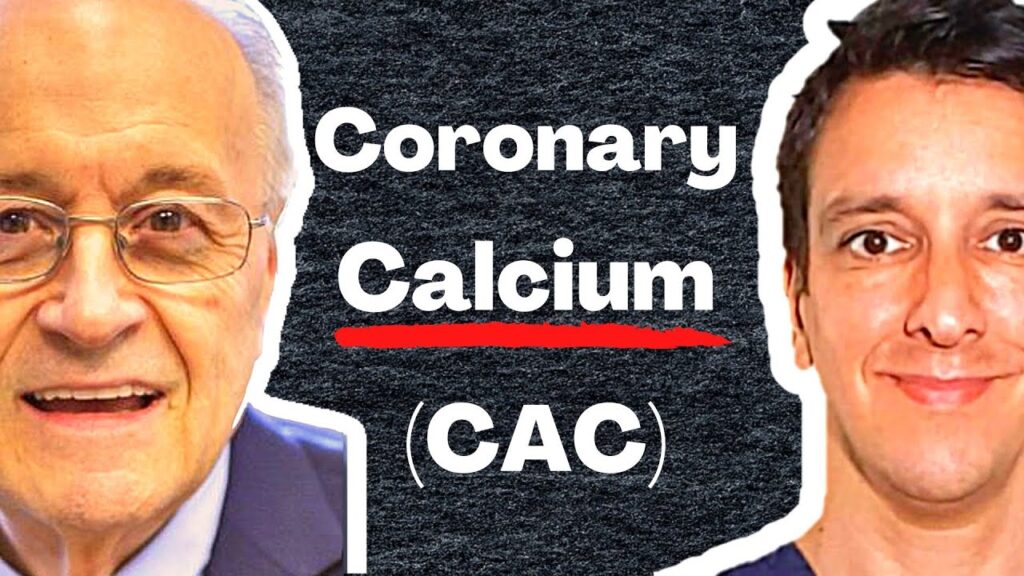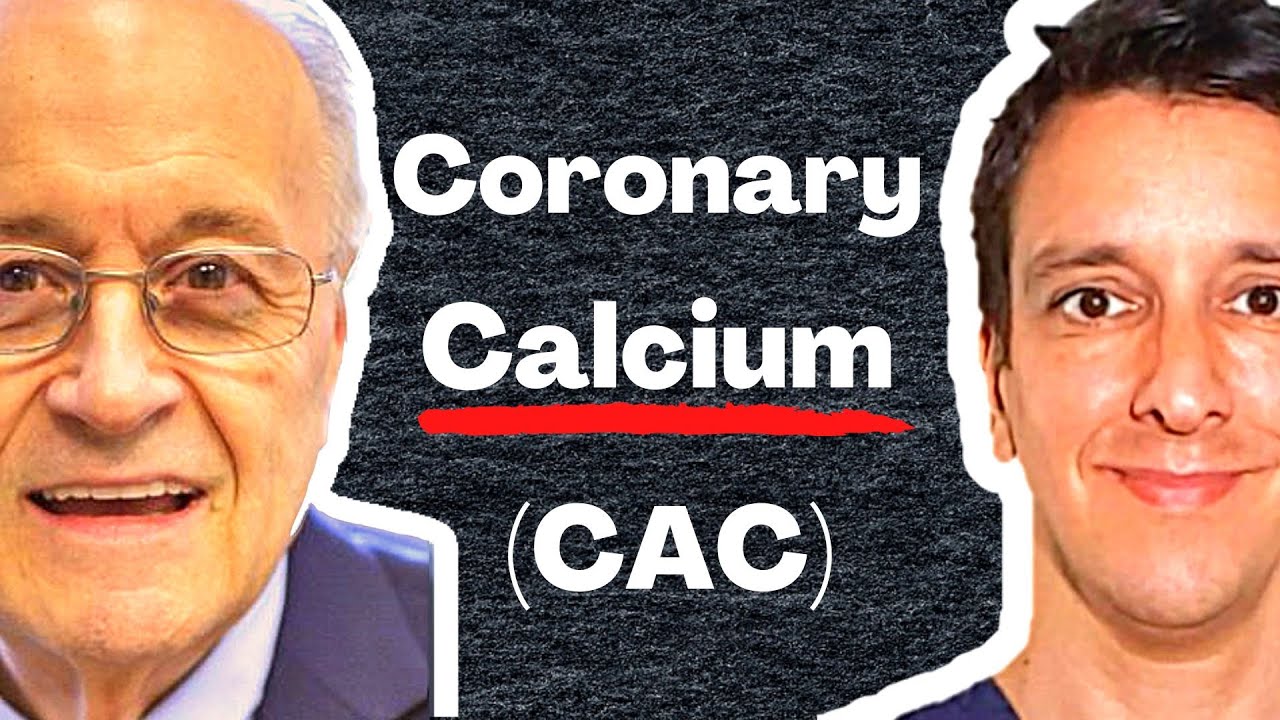Today we’re talking about the calcium scan or calcium score and we’re going to cover five super common myths about the calcium score. Let me know how many of these you find surprising, I’m guessing for most people it’s going to be most of them. First of all, what is the calcium scan? It’s basically a CT scan, works by x-rays, you lie down, they slide you into the scanner and it basically takes an x-ray image of your chest and it can show the calcification in your coronary arteries, so the arteries feeding blood into your heart muscle. In the end, you get a calcium score, which is basically a quantification of the amount of calcification in your coronaries. It’s a quick test, takes about 10-15 minutes and it costs about 100 bucks ballpark, depending where you go. The calcium score can be useful, it can give us an idea of how advanced the plaque in your arteries, in your coronary arteries is. So the first myth about the calcium scan is “I have a calcium score of zero so that means I have no plaque”. I see even medical doctors sometimes saying this on social media. That’s a big misconception. A calcium score of zero doesn’t mean no plaque because the calcium score doesn’t measure plaque per se, it measures calcification, and calcification happens pretty late in the disease process, in the plaque formation process, so it’s possible for me to have a calcium score of zero and have what’s called soft plaque, non-calcified plaque, and actually in some cases you can have plenty of it here’s a striking example, this study looked at people who had lots of plaque, the diameter of the coronary artery was reduced by 50 percent or more so they call that obstructive coronary artery disease. Out of those people, 14 percent had a calcium score of zero but it varied a lot depending on age, for older people, 70 years old or above, only five percent of people with that level of obstruction had a calcium score of zero, but for young people, under 40, it was 58 percent, so most young people with obstructive coronary artery disease, with a lot of plaque, had a calcium score of zero. They concluded that the diagnostic value of a calcium score of zero was small in younger patients and greater in older patients. They also followed 24 000 of these people with a lot of plaque for four years and about 30 percent of the heart attacks or death that happened in that group happened in people with a calcium score of zero. Don’t get me wrong, if you have a calcium score of zero the odds that you have obstructive CAD, obstructive coronary artery disease, that you have that much plaque, are very low it’s in the single digits, it just doesn’t rule it out because in people who do have a substantial amount of plaque, especially if they’re younger, calcification may not have had time to develop. So a calcium score of zero is good news all else held equal, it’s a marker of lower risk in most cases, it just doesn’t guarantee immunity, doesn’t guarantee safety. That’s the take-home message. Hope that makes sense. Also, good to remember we can have plaque in many other places besides the coronaries. In this study they found that out of people with a calcium score of zero, 54% had plaque in the legs or in the carotids leading up to the brain. To put it succinctly, a calcium score of zero is desirable but far from perfect. So think of calcium as the tip of the iceberg, it’s a marker of advanced disease, if you can see it it’s a signal that there is a lot more under the water, if it’s not there, if you can’t see it, maybe there’s nothing, but there could be, there could even be a substantial amount and it could even be growing fast, the calcium score can’t rule that out, especially at an early.

Myth: A CAC score of 0 means no plaque
Many people believe that a Coronary Calcium Score (CAC) of 0 indicates no plaque in the arteries. However, it’s essential to understand that CAC measures calcification, not plaque itself. Calcification is a process that occurs late in plaque formation, which means that even with a CAC score of 0, soft, non-calcified plaque may still be present. Therefore, having a CAC score of 0 does not necessarily mean there is no plaque in the arteries.
Myth: CAC score of 0 guarantees immunity from heart disease risk
While a CAC score of 0 is considered a marker of lower risk for heart disease, it does not provide complete immunity from cardiovascular issues. Calcification is a late event in the plaque formation process, and individuals with a CAC score of 0 should not assume they are entirely free from heart disease risk. It’s crucial to recognize that CAC can help estimate lower risk levels but is not a foolproof indicator of overall heart health.
Myth: CAC of 0 rules out long-term risk
Having a CAC score of 0 is generally associated with a lower 5-10 year risk of heart disease. However, it is important to note that a CAC score of 0 does not completely rule out the possibility of long-term risk. Plaque may still be present in other areas of the body besides the coronary arteries, indicating that while immediate risk may be low, there could be underlying issues that may pose risks in the long term.
Myth: CAC may miss calcifications
Some individuals may believe that a CAC scan can accurately detect all calcifications in the arteries. However, it is possible for CAC to overlook small calcium spots, leading to potential missed calcifications. Additionally, statin medications, commonly prescribed to lower cholesterol levels, can impact CAC results by potentially increasing calcification while decreasing the risk of heart disease by stabilizing existing plaque formations.
Myth: Zero calcium score equals zero risk
The value of a CAC score is not a one-size-fits-all indicator of heart disease risk. It’s important to consider age as a factor when interpreting CAC results. A CAC score of 0 may be more common in younger individuals, but it does not necessarily equate to zero risk. Apolipoprotein B (ApoB) levels should also be considered, as they may have differing impacts on an individual’s risk depending on their age.
Myth: Calcium score is zero in young individuals
Waiting for a calcium score to increase before implementing preventive measures is not always the best approach. While a CAC score of 0 may be common in young or middle-aged individuals, it’s crucial to understand that calcifications are markers of risk rather than the direct cause of risk. Preventative measures should be taken based on overall risk factors, not solely relying on a CAC score.
Myth: Statins increase calcification risk
Contrary to popular belief, statin medications may increase calcification but can also stabilize existing plaque formations. By stabilizing plaque, including calcifications, statins can help decrease the risk of heart disease. It’s essential to recognize that a calcium score can assist in determining an individual’s risk level and guide decisions regarding treatment options, including statin therapy.
Myth: Guidelines recommend statin therapy based on cholesterol alone
General guidelines for recommending statin therapy take into account specific cholesterol levels as well as other risk factors. It’s important not to rely solely on cholesterol levels when considering statin therapy. Factors such as age, overall cardiovascular health, and individual risk assessments should all be considered when determining the most appropriate course of treatment.
In conclusion, understanding the nuances of interpreting Coronary Calcium Scores (CAC) is essential for accurately gauging heart disease risk. While a CAC score of 0 can provide valuable insights, it is not a definitive guarantee of immunity from heart issues. By recognizing the limitations and potential implications of CAC scores, individuals can make informed decisions about their cardiovascular health.
